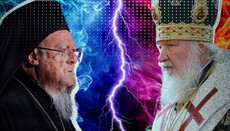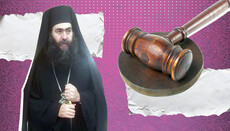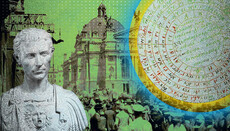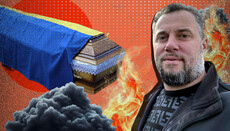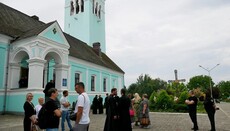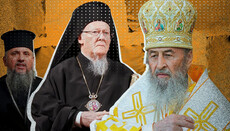DESS directives: A decisive step toward banning the Church?
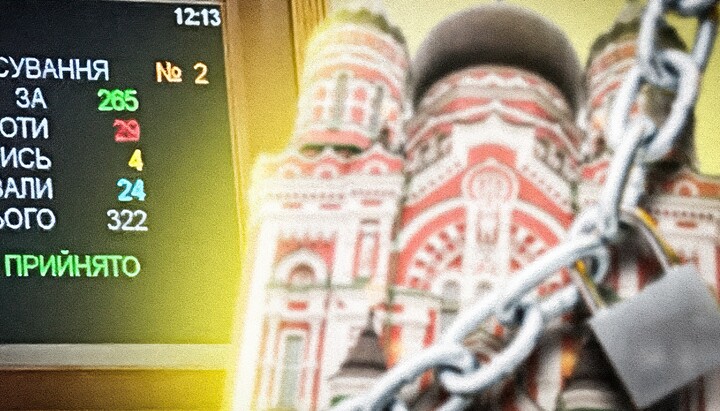
DESS has issued an order to the Kyiv Metropolia of the UOC to eliminate certain "violations" – or face a potential ban through the courts. But what exactly are these demands? And can the UOC comply without entering into schism?
On July 17, 2025, the website of the State Service for Ethnic Policy and Freedom of Conscience (DESS) published a document that serves as a logical continuation of the “investigation” into the Kyiv Metropolia of the UOC, which had “identified” signs of its affiliation with the Russian Orthodox Church (ROC). More details on this can be found in the article: “The UOC Recognized as Affiliated with the ROC: What’s Next?”
In accordance with the law banning the UOC (the Law of Ukraine “On the Protection of the Constitutional Order in the Activities of Religious Organizations” dated August 20, 2024), following the “identification” of affiliation with the ROC, the State Ethnopolitics Agency must issue orders to eliminate the violations – that is, to take specific actions aimed at eliminating this affiliation.
Scylla and Charybdis for the UOC
The DESS's logic is clear: declare autocephaly, and we’ll leave you alone. But this is precisely where the deception lies. In the canonical law of the Orthodox Church, there is no universally accepted definition of autocephaly or autonomy, nor is there an established procedure for proclaiming or granting autocephaly. Unilateral declarations of autocephaly have always led to schism, which could last for decades. For example, the so-called Bulgarian Schism lasted 73 years. The Ukrainian Orthodox Church does not wish to fall into schism, but on the other hand, for well-known reasons, it neither wants nor is able to remain within the Russian Orthodox Church.
In order to navigate between these two dangers – Scylla and Charybdis – various formulations have to be devised, proclaiming full independence while carefully avoiding the word “autocephaly.” But the DESS insists specifically on “autocephaly.” And their goal is obvious. In that case, the UOC would appear schismatic in the eyes of many (if not all) of the Local Churches, and there would be only one path left – to merge with the OCU. This, in fact, is the government’s “maximum program.”
In general, the very creation of the OCU and its recognition by the Ecumenical Patriarchate and three other Local Churches has so entangled the canonical situation of Ukrainian Orthodoxy that the proclamation of yet another “autocephaly” would drive it into a complete dead end.
What DESS wants
There are five directives in total. In essence, they boil down to the following:
- Withdraw from the Russian Orthodox Church (ROC).
- Declare the ROC Statute invalid for the UOC.
- All clergy of the UOC must withdraw from any ROC governing bodies.
- Declare invalid any ROC decisions concerning UOC dioceses in the occupied territories.
- Metropolitan Onuphry must declare his withdrawal from the ROC’s governing bodies.
It is unclear why DESS included the last point, since it is fully encompassed by point 3. But that’s not the most puzzling aspect of these “directives.” The fact is, all of them have already been fulfilled – comprehensively so – through the decisions of the UOC Council held at the Feofania Monastery.
One of the Council’s resolutions states: “The Council adopted appropriate amendments and additions to the Statute on the Governance of the Ukrainian Orthodox Church, testifying to the full self-governance and independence of the Ukrainian Orthodox Church.”
This has been said many times, but let us repeat:
Secular legislation cannot operate with the terms “autocephaly” or “autonomy” in their ecclesiastical sense. It operates with terms like “self-governance” and “independence.” This is precisely what is stated in the decision of the Council in Feofania: “the full self-governance and independence of the UOC” from the ROC.
Nothing more can be added to this – at least not within the framework of secular definitions. Issues such as Eucharistic communion or canonical interdependence (for example, where bishops of one autocephalous Local Church may excommunicate bishops of another) fall entirely outside the scope of secular law and government administration.
By this decision, the UOC has already fulfilled at least four out of the five requirements set forth by DESS:
– It is not part of the ROC;
– Its clergy, including Metropolitan Onuphry, are not members of ROC bodies;
– The ROC Statute does not apply to it;
– And it has declared that ROC decisions regarding dioceses in occupied territories are not binding.
Just a few days after the Council in Feofania – on June 1, 2022 – His Beatitude Metropolitan Onuphry sent letter No. 0464 to the then-head of DESS, Olena Bohdan. This letter is available on the DESS’s official website.
In it, the UOC formally declared its separation from the Moscow Patriarchate.
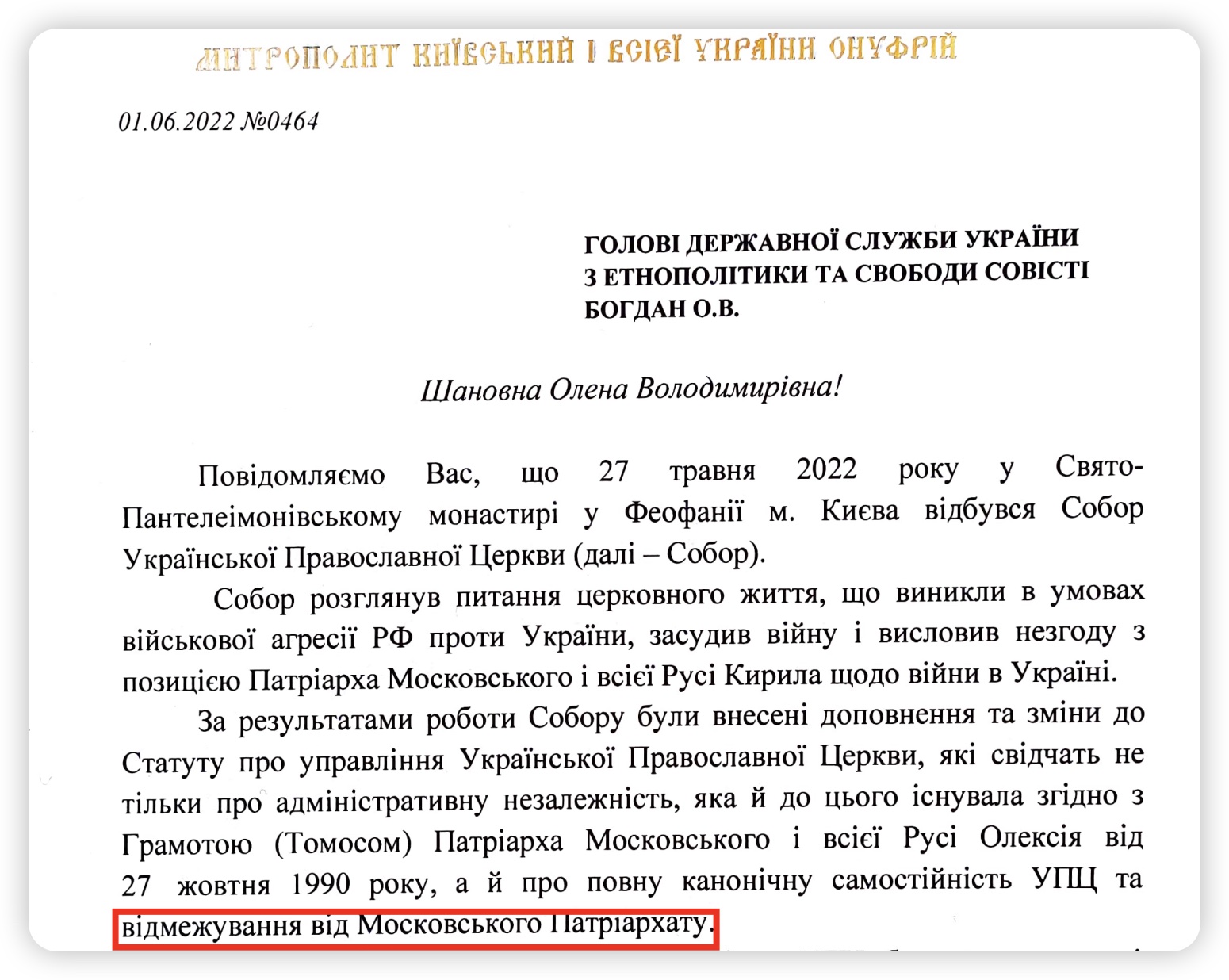
The letter also states that the Primate of the UOC is no longer a member of the ROC Holy Synod.
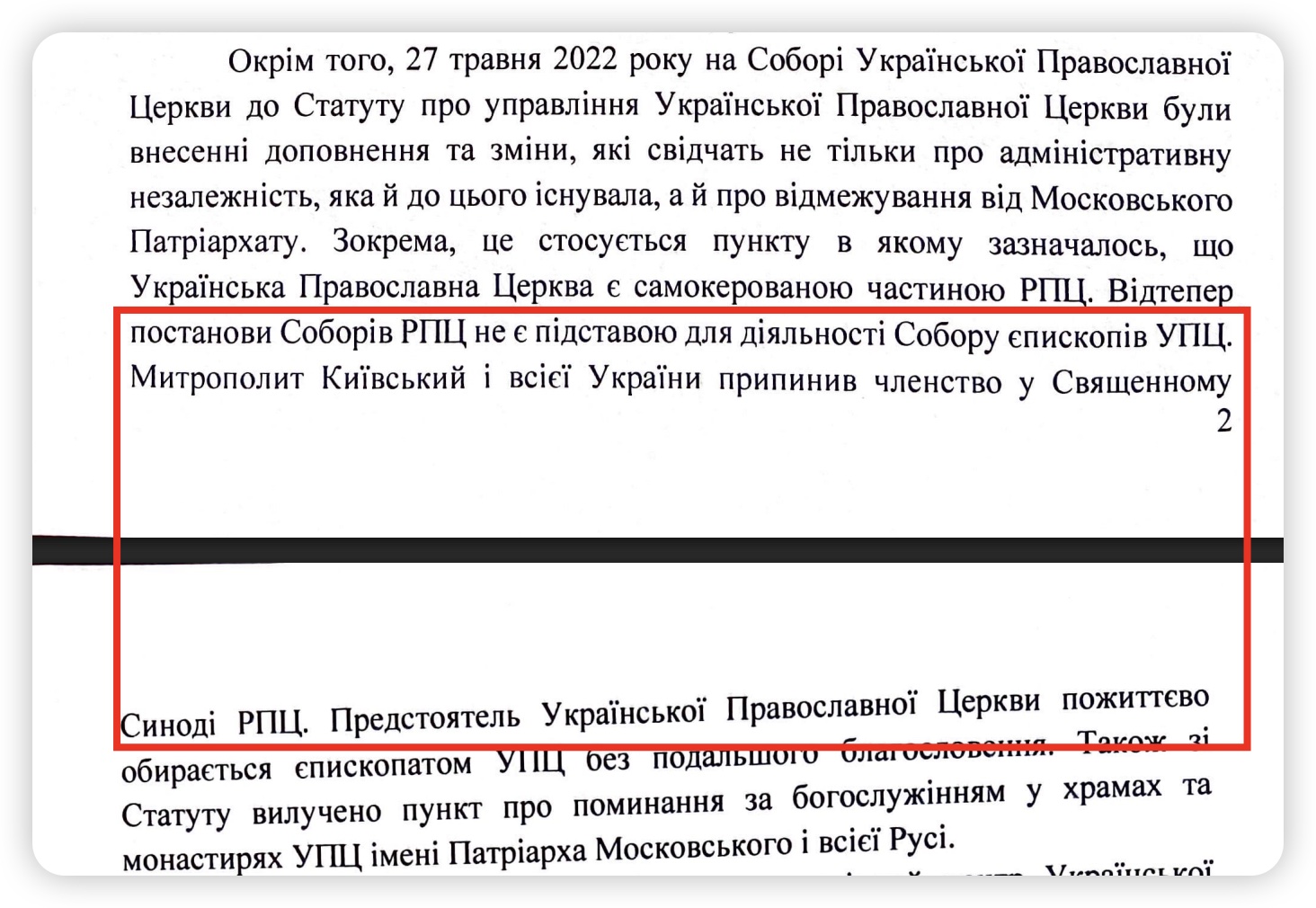
The fact that the decisions of the ROC Councils are no longer the basis for the functioning of the UOC Council of Bishops precisely means that the UOC considers the ROC Statute invalid for itself.
As for the rejection of ROC decisions regarding UOC dioceses in the occupied territories, this issue is also addressed in one of the resolutions of the Feofania Council. It reads:
“During the period of martial law, when communication between dioceses and the ecclesiastical governing center is difficult or absent, the Council considers it appropriate to grant diocesan hierarchs the right to independently make decisions on various matters of diocesan life that fall within the competence of the Holy Synod or the Primate of the Ukrainian Orthodox Church, with subsequent notification of the ecclesiastical authorities once communication is restored.”
This resolution specifically concerned the administration of dioceses in the occupied territories. The bishops there were granted the ability to make decisions independently based on the situation on the ground. Active hostilities, shelling, problems with basic survival, occupation – all of these are incredibly difficult and complex. In order to help, or at the very least not exacerbate, the suffering of the faithful under these conditions, the UOC Council in Feofania adopted this decision. Whether or not to comply with the decisions of the ROC Synod is left to the discretion of each diocesan bishop.
There are documents that directly confirm the fulfillment of the DESS’s directives. On October 31, 2024, a statement was published by the bishops of the Ukrainian Orthodox Church regarding the actions of the ROC Synod concerning the dioceses of the UOC located in the temporarily occupied territories of Ukraine. It expressed disagreement with the actions of the ROC Synod with respect to the Donetsk diocese. The statement was signed by about one-third of the UOC hierarchs. And although it does not have the status of a resolution of the Synod or the Council of Bishops, it reflects the attitude of at least a portion of the UOC episcopate toward the actions of the ROC.
A logical question arises: why was such a statement not issued by the UOC’s governing bodies? In our view, the reasons are as follows: first, it could play into the hands of certain forces within the ROC who are demanding that the UOC be declared schismatic. And second – and more importantly – what measures could the UOC take in such a situation? Ban clergy who comply with ROC decisions from serving? Declare their sacraments invalid? Excommunicate them? In other words, make life even more difficult for ordinary believers living in the occupied territories? All such actions could cause harm, not good.
Thus, four out of the five DESS demands have in fact been fulfilled. As for the ROC’s actions in the occupied territories, questions may remain, since there has been no direct condemnation at the official level by the UOC. But even in that case, it does not affect the UOC’s independence and self-governance in any way. There is also no evidence that the UOC accepted these actions.
For example, in response to the ROC’s decisions regarding the Kherson Eparchy, the UOC made the following statement:
“In light of media reports regarding the activity and structure of the Ukrainian Orthodox Church in the Kherson region, it should be noted that according to the canonical documents upon which the UOC operates, the creation and reorganization of new dioceses within its canonical territory is carried out exclusively by the UOC Synod or the UOC Council of Bishops. At present, no such decisions regarding the structure of the Kherson diocese have been made by these highest governing bodies of the UOC. Therefore, no changes to the canonical structure of this diocese have taken place.”
What’s next?
It can be assumed that UOC officials will issue a statement declaring that all the DESS’s demands have in fact been fulfilled and will provide as evidence the resolutions of the UOC Council in Feofania on May 27, 2022, and the letter from His Beatitude Onuphry to the DESS dated June 1, 2022. Some clarifications may also be offered to help the less perceptive DESS officials understand the meaning of the Theophany Council's resolutions.
Will the DESS accept these explanations? With near certainty – no. That is not why this entire campaign was launched. It was never intended to conclude with a “very well, we’re satisfied” and a cessation of the persecution of the UOC. If the DESS were genuinely satisfied by evidence that the UOC is truly independent from the ROC and not part of it, then the “investigation” declaring it affiliated would never have appeared in the first place.
It is also highly likely that the UOC will not convene a new Local Council and “re-decide” all of these issues in a manner that satisfies the DESS bureaucrats. Such a step would lead nowhere. If the government is set on destroying the Church – no amount of compromise will appease it. But the UOC might well end up being accused of schism.
The next step for the DESS will likely be to file a lawsuit demanding the banning of the UOC.
The courts, of course, are entirely controlled by the authorities, but during open court proceedings the absurdity of the DESS’s position will be evident to all observers, including Local Churches and international human rights organizations. In this, one may see a silver lining: in their eyes, the UOC will be further confirmed as a confessor Church. This means, first, that there will be no further recognition of the OCU, and second, that in the future, this may facilitate the recognition of the UOC as an autocephalous Church, when that question is formally raised. The chances of the court siding with the UOC are minimal, but they do exist. Everything will depend on the political landscape at that moment.
The fact that the DESS intends to continue down the path of destroying the UOC is evidenced by the fact that it has already compiled a list of organizations affiliated with the Kyiv Metropolia of the UOC. This list includes all dioceses, monasteries, and so on. They are receiving a clear message – disassociate yourselves from the Kyiv Metropolia, or you will be banned.
Will the authorities succeed in banning the UOC? God alone knows.
“Many are the plans in a person’s heart, but it is the Lord’s purpose that prevails” (Proverbs 19:21).
The actions of the Ukrainian authorities are a flagrant violation of the Constitution, of the right to freedom of religion, and an intrusion into the internal life of the Church. Sooner or later, everyone involved in this persecution will have to answer for it – if not before men, then before God.
As for the Church – this is a time of confession, which it has endured more than once in its history. The Church will survive; the gates of hell shall not prevail against it. But whether every Ukrainian Christian will remain within the Church – that depends on each one of us.
At the same time, it must be emphasized that the time of confession places special demands on us: intensified prayer and unity. We cannot afford any disagreements on any issues – especially political ones. At a time when wolves circle the flock of Christ, any division will allow the predators to scatter the sheep one by one.
“Therefore, whoever confesses Me before men, him I will also confess before My Father who is in heaven. But whoever denies Me before men, him I will also deny before My Father who is in heaven” (Matthew 10:32–33).
